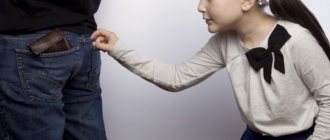: Reading time:
A boy of the same age beats his mother and keeps the whole family in fear? Yes, this happens too! Child psychologist Elena Lagunova tells why and what to do.
A one-year-old child with an equally innocent look can ask to be held and beat his relatives. Because he doesn't really understand the difference.
At my reception, a young mother, Katya, complains:
“My one-year-old child fights, Sevushka beats everyone - me, dad, brother. The cat also gets it, although it probably happens to everyone. What's next? Well, okay, when something is not according to him, and more often it’s simple, for no reason. Maybe with a cheerful face he can come up and knock. I almost roared from surprise (or even pain) and said: “My dear, honey, don’t be angry. You can’t do this, it hurts mommy. Do not do it anymore". And he laughs. Doesn't understand words. And it’s the same on the playground. If you like someone else’s toy, you take it away. And who is he so aggressive, he’s just a bandit! Is it because it's a boy? Maybe it's time to treat him? Or a belt, as dad suggests? So tell me, is this generally normal, no?”
At this time, her son Sevushka looks at me with angelic eyes, takes timid steps around the office, calmly plays with toys and, you know, doesn’t look like a bandit at all.
Catherine can be understood. Any parent wants to raise a child who knows how to communicate in a friendly manner. But how to do that? Where does such aggression come from at this age?
Causes of aggression
Just as a child’s game of war cannot be taken seriously as an attempt on the lives of the participants in the battle, not every blow is a sign of a child’s aggression towards loved ones .
How can you recognize when it’s time for your child to explain the boundaries for his behavior desired by those around him and what his attempts to behave rudely with others really mean?
Of course, if the child is too small and is not yet able to not only evaluate his actions, but even has difficulty controlling his own hands, no one is safe from accidental hits in the face.
But if in the future adults do not show that such actions are an undesirable phenomenon, then the habit can take hold in the subconscious of the little person and become a completely acceptable practice for him.
Why do children hit their parents?
Age 1-2 years:
- In infants, coordination of movements is far from perfect , so all blows that occur are on the conscience of the adult caring for the child.
- Children one year old and a little older begin to socialize and try to determine their place in the family through aggression. This is not a pathology, but a sign of the natural development of the child.
To avoid problems in the future, the process must be monitored and used for educational purposes. - One of the adults taught the child a game conventionally called “punish mom and dad,” or he himself behaves aggressively towards them. And the child reads the information and copies the behavior.
Age 3-4 years:
- Spoiledness and permissiveness , lack of an adequate response to aggression towards an adult.
- Hysterical character.
An instantly excited psyche requires a quick release, so the process is poorly controlled by consciousness and is not regulated by internal “brakes” that appeared due to upbringing. - A tense family situation or even violence: what the child sees is what he reproduces.
- Developmental deviation. Children with serious mental illness cannot control their behavior.
Age 5-6 years:
Preschoolers already understand well the difference between permissible and impermissible behavior if they grew up in an adequate environment.
Therefore, any non-playful attempts to hit an adult or parent are a sign of a serious problem .
- the child is allowed to do everything, which is why he is accustomed to the fact that no one can tell him;
- deviation in mental development;
- living in a family where demonstrations of violence and aggression are normal practice;
- access to violent videos.
Why does a one-year-old baby hit his mother in the face?
While he is just beginning to explore the world, slapping the face is a way of understanding the world and one of the few forms of protest available to a child at the moment. The child does not yet fully realize that in the adult world this is a way of expressing insult, humiliation and aggression.
But in any case, it is strictly forbidden to transform an accidental blow into a game format, inciting the child to repeat spankings in the face of the mother or another person again and again.
The child may begin to develop an essentially disgusting habit of getting pleasure from hitting someone. In the future, this skill base may be the reason for a poorly realized but persistent urge to bully someone.
An intentional blow should be stopped with words indicating your dissatisfaction with such behavior and blocking the raised arm and leg for a second action.
If a child persistently tries to perform a blow and succeeds, you can counter the manipulation with a response action . Naturally, not in full force, but noticeable.
For example, tap the handle with your finger and strictly say that you can’t do that. Even without yet understanding the meaning of many words, when children reach the age of one year, they already perfectly recognize intonations and are able to respond to them correctly.
One-year-old child hits his mother
Most often, the baby hits his mother while having fun or without realizing the seriousness of his behavior. Thus, the following reasons can be identified:
- The child is playing around and has too much energy
- The baby studies the world around him, including his body and its capabilities.
- This is how the baby expresses his emotions. Prohibitions have begun to appear in the child’s life, so in this way he can protest
- The child wants to attract the attention of his parents
IMPORTANT: Do not think that your beloved baby wants to offend you and hurt you. At the age of one year, the child hits his mother unintentionally
What to do?
A child hits his parents when he freaks out: what to do? From the age of one and a half to two years, children quite consciously perceive themselves and the world around them within the family.
With proper upbringing, they already have some understanding of the boundaries of normal behavior, but, naturally, they are not always able to control their aggressiveness and other strong emotions.
But they are gradually learning the connection between bad behavior and subsequent punishment in the form of a ban on dessert, playing on the computer, etc.
Directly at the moment of hysteria, one of the options for an adult’s behavior may be to hug the child tightly and lock his arms and legs.
With a normal child’s psyche, such influence quickly has the desired effect, since it does not allow the child to go all out.
In addition, the calmness of an adult also has a positive effect.
What to do if a child is naughty? Read about it here.
The child is testing the boundaries
The baby is growing, exploring the world, and he needs to try and learn everything. Through aggressive behavior, he learns to understand what is good and what is bad. If a baby hit a girl on the playground, why can’t he hit his mother when she swears or doesn’t allow her to do something?
In this situation, child psychologists advise talking to the fighter and explaining that hitting and biting other people is unacceptable. Do not grab the baby by the hands, hit or pinch him back, or put him in a corner. This behavior will provoke an even greater attack of aggression. A strict prohibition (“I forbid hitting mom or dad”) can lead to the child starting to punish himself.
Typically, children bite their nails, pull out their own hair, give themselves bruises, and even bang their heads against the wall. You cannot force yourself to keep emotions to yourself, otherwise it may have a negative impact on the child’s fragile psyche. But how to teach a child to throw out negativity, and at the same time convey that parents should not be hit? Preschoolers feel well the emotions that mom and dad experience. For example, with the help of facial expressions, a mother can show that she is unhappy and upset. Only this must be done sincerely, truly expressing your emotions, and not playing a role.
How to behave?
Demonstrate to the child your dissatisfaction with the behavior using facial expressions and a stern voice.
It is advisable to block every blow with an interception, fix your arm or leg in the air and say out loud that you cannot behave this way.
In the absence of the desired reaction, warn the child about a subsequent retaliatory strike on your part if the child does not stop the attacks.
At the end of the acute phase of aggression, find out the cause of its occurrence and eliminate factors to prevent relapse.
It is important to get those around you (husband, other relatives) to adhere to the policy of resisting the child and humanely stopping aggression, and not encouraging him with statements like: “So she is!” Come on, come on! Here’s a naughty mom, come on, come on, spank her.”
What not to do if a child hits his mother
How to behave incorrectly if your daughter or son shows aggression:
- Hit back, use force. Violence begets violence.
- Screaming, cursing. This will only cause the child to become more hysterical.
- Pretend, play performances with resentment or crying. Children are good psychologists; they know how to read their parents’ emotions.
- Punish by “throwing” in the middle of the street or locking in a room. This will only worsen the hysteria, as the child will also have a fear of losing his mother.
How to stop fighting with your parents?
Adhere to the same line of behavior as described above.
If the situation repeats frequently or in cases where the child continues to try to punish older relatives, it is better to consult a psychologist to determine the essence of the problem and the factor provoking such behavior.
Advice from psychologists:
- Don't confuse a baby's occasional slap in the face with someone trying to hit you. But in any case, do not turn such actions into games if you do not want the formation of an incorrect behavioral matrix.
- Pay attention to the point of uniform behavior of adults in this matter : any actions reminiscent of beating should not be used as an element of the game. Pillow fights, soft sword fights, boxing, and playful romp do not count.
- The first cases of pugnacity may be a sign of interest in the breadth of the boundaries of acceptable behavior and a desire to clarify one’s position in the “pack.” Therefore, do not panic, but simply explain that you cannot behave this way and that you are the main one in the family, not the child.
- Find out the reason for aggressive behavior.
If you are spoiled, urgently and categorically change your parenting methods. If there is an aggressive atmosphere in the family, look for a way to change the situation. If you identify an irritating factor in the form of aggressive computer games or movies, eliminate it. - Seeing the child's accumulating irritation, give him the opportunity to run around to his heart's content or get carried away by active play .
- Be sure to respond to unacceptable behavior and stop it at the beginning of the conflict.
- Always try to find out the reason for anger .
- Form in your child the concept that the feeling that has taken hold of him is anger and it is normal to feel it, but it is forbidden to manifest it in the form of physical punishment of someone else. Be sure to follow this line of behavior yourself.
- Don't sort things out in front of your child. He will perceive aggression without even understanding the meaning of the words, and will definitely work it out with you or someone from the environment.
Baby doesn't get enough attention
If it is customary in a family to treat each other politely and respectfully, but the little robber continues to beat his parents, you need to analyze whether he has enough attention from adults. For example, the baby asks his mother to draw or read, and she is talking on the phone with a friend or preparing dinner. “Don’t bother me, watch cartoons,” “Can’t you see that I’m busy?” The baby does not receive the necessary portion of attention from his parents and is ready for any action if only mom and dad pay attention to him.
What should parents do? You must understand that preschoolers need more than just the basic needs that adults can provide (feed, bathe, comb their hair, dress them, put them to bed). Take a break from your obviously very important matters and spend time with your child. In the end, there is nothing more important than sincere communication with your baby. You can come up with so many interesting activities: sculpt together, draw, organize a puppet theater, organize a fashion show, or play repair shop. The main thing is that you work with your baby sincerely, with desire, and not because “it’s necessary.”
1) Expression of emotions.
A child is not a robot, but a living person, and therefore cannot not express emotions at all or express only joy. In preschool age, children's expressions of emotions are usually spontaneous, that is, children do not know how to control emotions, suppress them, or think about whether they are behaving correctly or not. Therefore, if a child feels anger or anger, one of his natural reactions is to hit the offender, even if it is a parent.
In addition, a child can express resentment, sadness, or boredom in this way, because he may simply not yet know other ways to express emotions. And if you do not allow a child to show expression, even in such a form as pinching and hitting, then he may lose basic life guidelines and may never learn to understand whether he is good or bad, whether he wants something or not.
The most correct thing would be not to scold the child, but to teach him to recognize his emotions. Ask him how he feels now. Discuss with your child what this or that emotion means. Offer other, alternative options for expressing feelings: draw resentment, imagine sadness, beat pillows, shout out the window.











